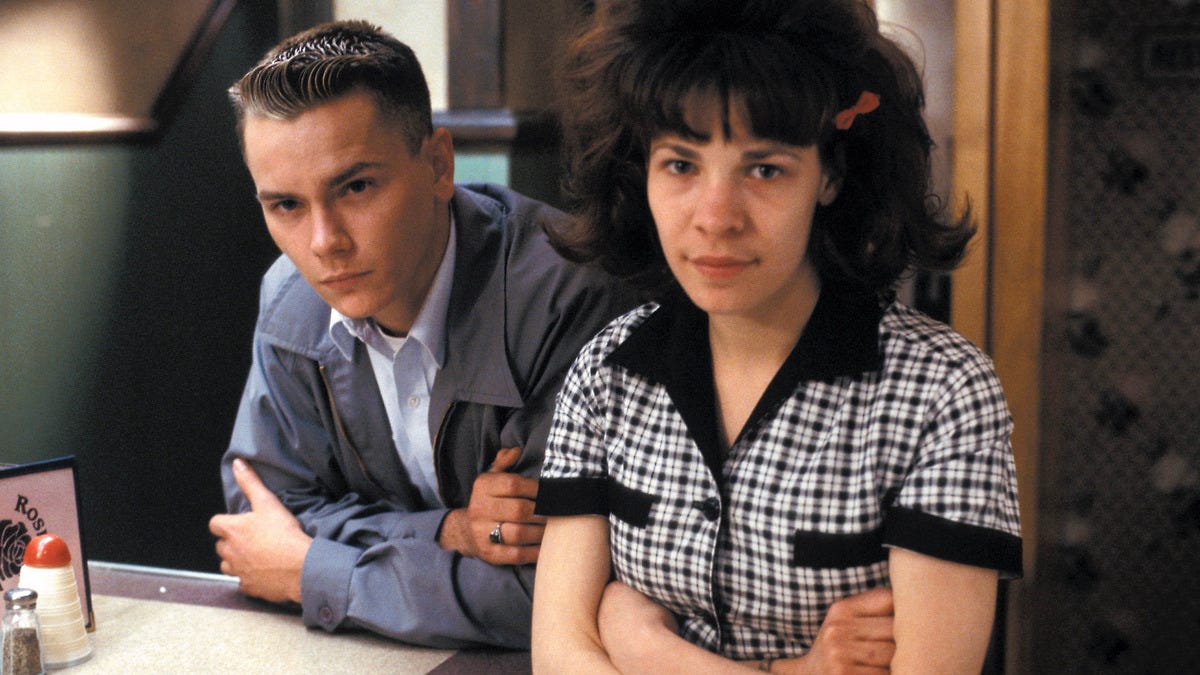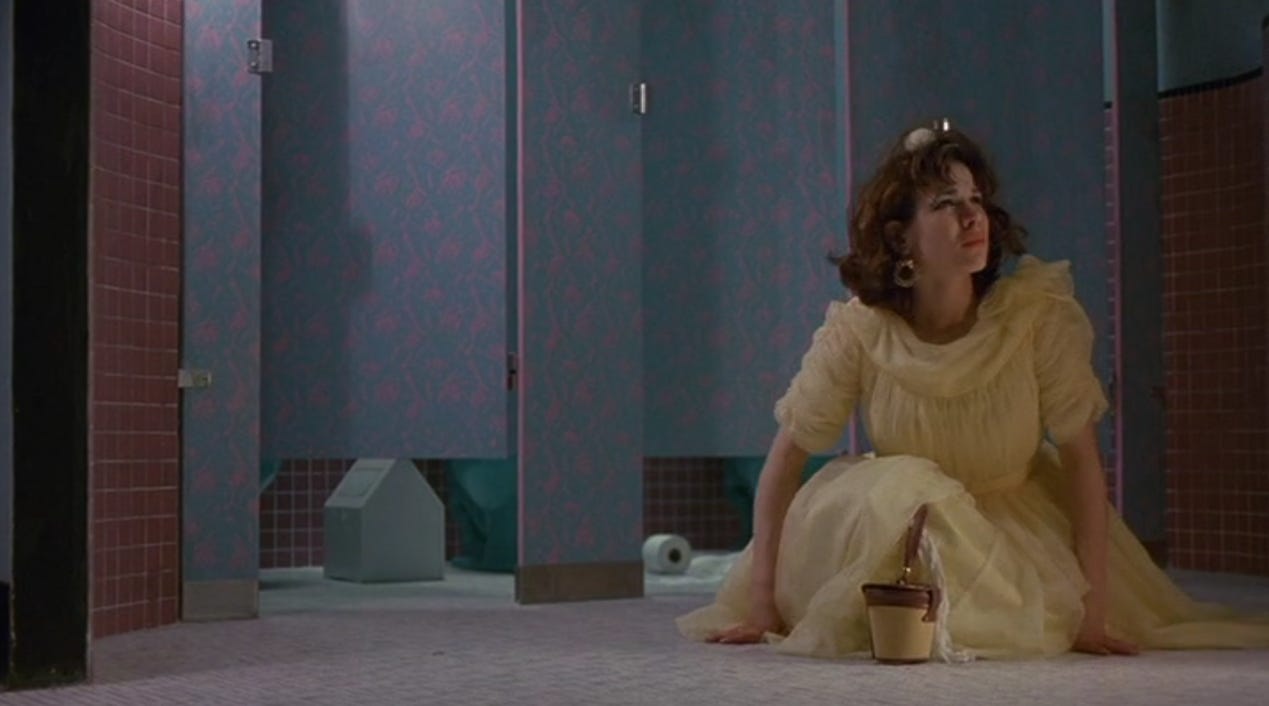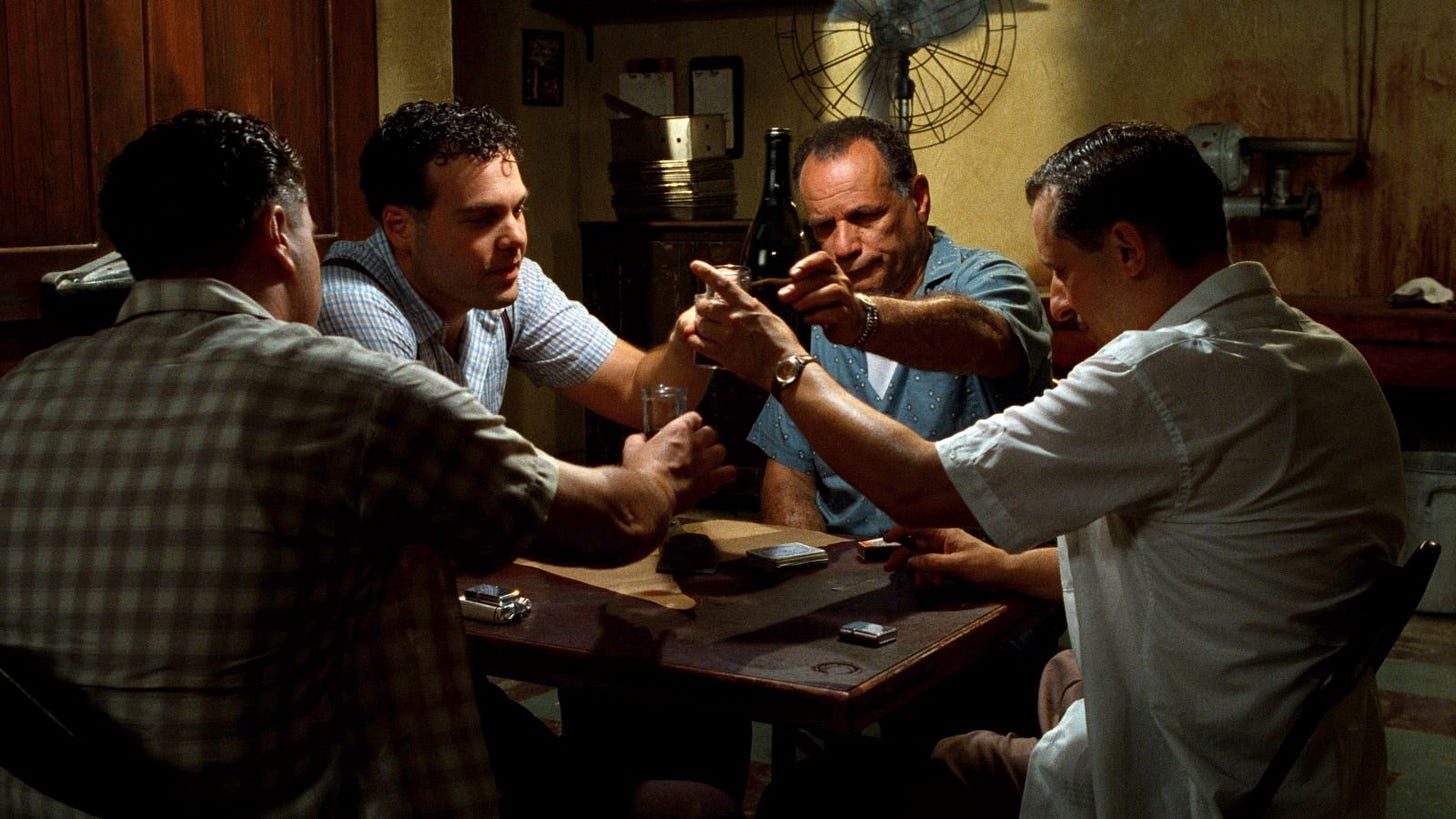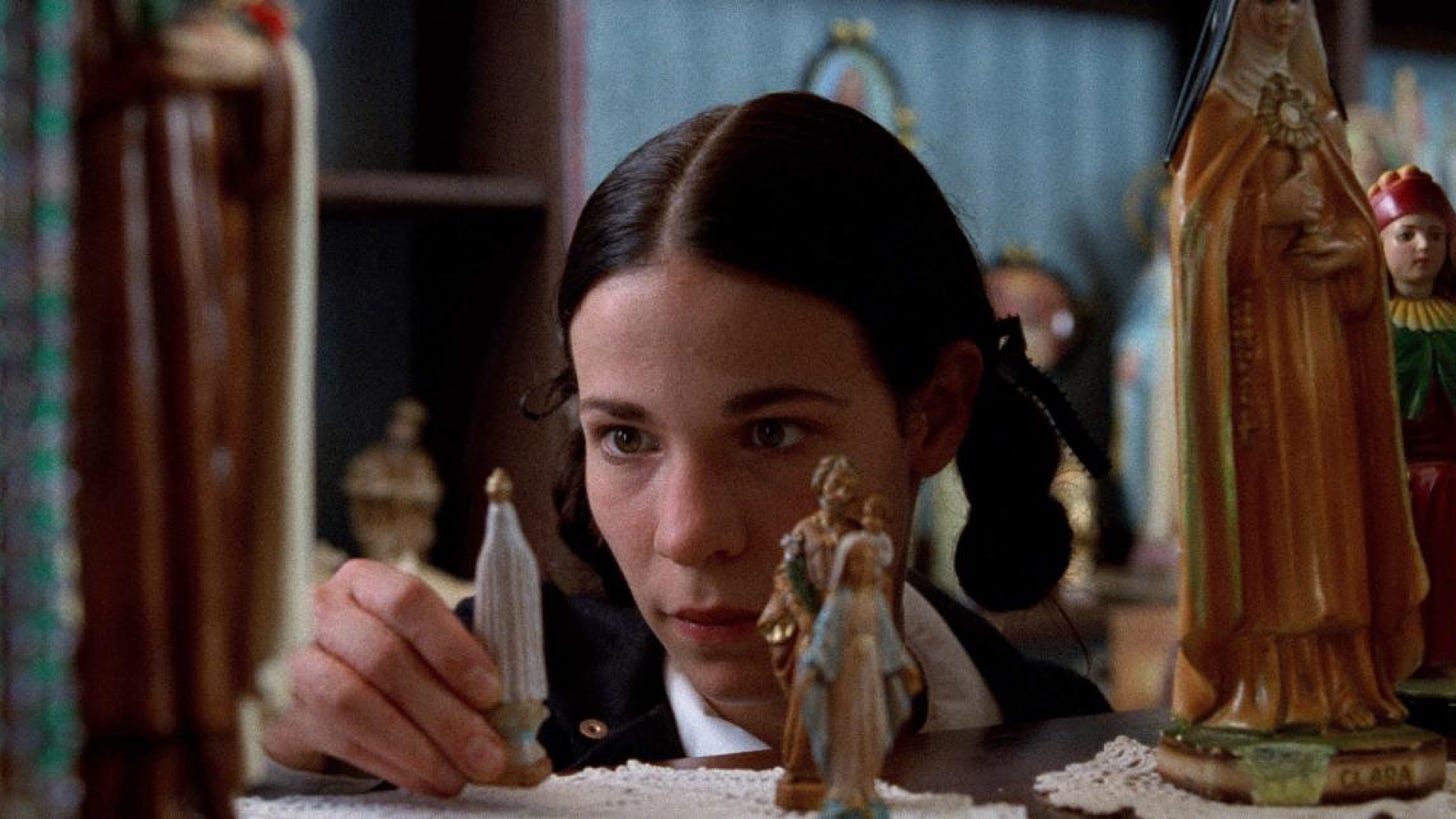The Overdue Arrival of Nancy Savoca
With a new Criterion edition of 'Dogfight' and a 4K restoration of 'Household Saints,' one of the most promising indie voices of the '90s finally takes a bow.
Starting with the Sundance Film Festival in January—which, at the time, was still two years away from officially transitioning its branding from The US Film Festival—1989 was a true watershed moment for American independent cinema. It was the year when Steven Soderbergh’s sex, lies and videotape stormed the festival circuit and proved that indie films turn a massive profit. That’s not to say that independents were not thriving in the margins in years past, but you can look back and see the scaffolding erected for a lucrative business model, starting with sex, lies and Miramax and growing to the point where every major studio would have its own specialized divisions, some with hilariously contradictory names like Warner Independent Pictures. The business will evolve and devolve from there, with the boom-busts of mini-majors and streamers, but 1989 was the year everything changed.
Yet sex, lies and videotape did not win the Sundance Film Festival, even though it would go on to win the Palme D’Or several months later. It won the Audience Award instead. The Grand Jury Prize went instead to True Love, a debut feature by Nancy Savoca, a Tisch School graduate from the Bronx who’d spent most of the ‘80s kicking around small projects—she was a production assistant on John Sayles’ Brother From Another Planet, and served as assistant auditor on Jonathan Demme’s Something Wild and Married to the Mob—before she and her husband, producer Richard Guay, scraped together a budget for her own film. Though True Love found a distributor, United Artists, and opened to warm reviews and decent box office, there’s some feeling, in retrospect, that it had missed its cultural moment. Savoca’s charming comedy about an Italian-American wedding in the Bronx has a great feel for the particularities of neighborhoods, language, and cultural quirks, but it would not take off like the much broader Sundance hit The Brothers McMullen or My Big Fat Greek Wedding years later.
That seems like the story of Savoca’s career, which has never quite emerged from the margins, despite two follow-up films, 1991’s Dogfight and 1993’s Household Saints, that more than affirmed her talent, but made less money combined than True Love. Yet we know that film history is not written by the winners. Just as the hits of today turn into the obscurities of tomorrow, the misses of yesterday can become canonized in the future. And within just the last several months, we’ve experienced a minor Savocaissance that has suddenly brought her the kind of recognition that’s been more or less delayed for 30 years. For last year’s New York Film Festival, Kino Lorber and Milestone came together for a 4K restoration of Household Saints, Savoca’s treatment of the myths and miracles within an Italian-American family in New York, and last week, Criterion released Dogfight, her bittersweet ‘60s romance between a young Marine bound for Vietnam and the wallflower he courts under cruel circumstances.
***
There’s something apropos about Savoca’s late appreciation because her characters are themselves diamonds in the rough, waiting to be discovered. In Dogfight, when Lance Corporal Eddie Birdlace (River Phoenix) walks into Rose’s coffee shop in San Francisco on a rainy night in November 1963, it takes him a while to spot Rose Fenny (Lili Taylor), a waitress quietly strumming her guitar in the back of the restaurant. In silhouette, she casts an awkward figure, with hair matted and frizzy after a long day waiting tables and a singing voice muted to the point where only she can hear it—partly because she doesn’t want to create a distraction in her mother’s business, but also because she can’t summon the confidence to perform. When she turns around, she’s not unattractive, but her extreme self-effacement marks her as the “ugly duckling” type. Eddie sees her as a project and not in a kind way.
The “dogfight” of the title is a contest that Eddie and his Marine buddies—notably the three guys who make up “The Bees”—hold to determine who can bring the ugliest woman to a party. On the night before deployment, the men strike out to the city’s streets, restaurants, and train depots to recruit the right date and then spend the evening merrily drinking up while snickering at the women on the sly. Eddie sweet talks Rose by flattering her musicianship and feigning expertise on the folk scene, and Rose is too inexperienced and overwhelmed to call him on his bullshit, even when he invents a songwriter who supposedly collaborated with her musical heroes. That’s how Eddie needs her to be: The lonely, desperate, painfully earnest young woman who still lives with her mother in a tiny apartment above the coffee shop, like Laura Wingfield in Tennessee Williams’ The Glass Menagerie.
He underestimates her. He also underestimates himself. Though the dogfight may be the hook for the movie, the event happens only about a third of the way through this exceptionally economical 94-minute story. It is the catalyst of Eddie and Rose’s relationship, not the culmination. When Rose emerges from her apartment in an ill-fitting yellow dress, with a messy updo frozen by hairspray and blocky smear of lipstick, Eddie smiles smugly, like a talent scout who spotted her negative potential. But as they step out together, Rose starts to surprise him. She sees a poster for a piece of escapist piffle called The Trouble with Mimi and laments a society “watching this trash that doesn’t mean anything.” She talks about wanting to join the Peace Corps and make a positive difference in the world. She’s flattered to be on a date with a handsome suitor like Eddie, but she also clearly loves being out in the open, breathing something other than the stale air she and her mother share all day.
Though Eddie does make a last-ditch effort to steer her away from the dogfight, it happens and Rose finds out about it in the worst possible way, from the toothless prostitute Eddie’s squad leader has brought in as a ringer. Yet he’s eventually able to coax her out again with a sincere apology and the night takes a much different turn, as they learn more about each other and their acute vulnerabilities. Behind that macho jarhead swagger, Eddie is even less certain of himself than Rose, having drifted into service for lack of any viable option—or even the imagination to think of something better. He’s angry and the military seems to suit his aggression, but the war in Vietnam is too new for him to realize what he’s getting into. On that front, Rose doesn’t know much, either, other than to assert her conviction that violence begets more violence, and that music can truly touch the soul.
Savoca is a master of domestic space and cultural detail. Her small corner of San Francisco changes dramatically between November 1963 and later in the decade, when Eddie returns to a city transformed by the counterculture and small pockets of reactionaries, each group with their own take on a man in fatigues. The ending of Dogfight is absolute perfection—one of those rare moments when you hope a fade to black is coming and yet are surprised when it does—but Savoca and her actors are particularly good in more intimate scenes, like when Rose sneaks Eddie back to her bedroom. Now she controls the night and her bedroom, lined with pictures of her folk idols, speaks to a secret passion that she can finally share with someone else. In this room, Lili Taylor animates Rose like the bloom her name implies and she’s able to recognize Eddie’s genuine need for her, as the bullshit of his courtship has dropped like a veil, revealing the sort of raw sensitivity that River Phoenix could play like no other actor. The country will fall into an abyss during the time they’re apart, but this connection will sustain itself.
***
There’s plenty of Dogfight (and True Love, for that matter) in Savoca’s follow-up film, Household Saints, particularly in the period setting and in the suffocating insularity of a working-class home where nobody, especially the women, are expected to do anything with their lives. Yet the film, executive produced by Jonathan Demme, is a major uptick in ambition, courting complicated themes about the tension in the Italian-American community between modernity and tradition, America and the Old World, and the hold Catholicism exerts over multiple generations. Without knowing it’s based on a novel by Francine Prose, you’d probably guess that it’s an adaptation, given how much narrative punch is conceded in favor of a slice-of-life that spills out in multiple directions at once. You could describe Dogfight in 20 words or less. An elevator pitch for Household Saints would only work if the elevator got stuck.
Nevertheless, Household Saints does appreciate the power of storytelling enough to begin with an elderly couple relaying a piece of family lore for the younger generations about the time Joseph Santangelo “won his wife in a pinochle game.” And from there, Savoca and Guay, who co-wrote the script, flash back to the San Gennaro Feast in 1949, when the weather was so hot in New York that nobody showed up, including Joseph (Vincent D’Onofrio), a butcher renowned for his sausages. The fateful card game in question pits Joseph against three other sweaty men in the backroom of his shop, notably Lino Falconetti (Victor Argo), who agrees to stake his daughter Catherine (Tracey Ullman) in the game if Joseph offers up another blast of cold air from his freezer. Joseph gets a great hand—a miracle hand, all hearts—and holds Lino to the bet.
It’s not the greatest premise for a marriage, but it’s certainly no worse than the start of Eddie and Rose’s relationship in Dogfight, and the two eventually settle into a real partnership, if not a swooning romance. Savoca gets big laughs out of the domestic tension between the newlyweds and Joseph’s Old World mother Carmela (Judith Malina), who believes from the start that the Falconettis are a poor, miserable family and Catherine will be a curse on the Santangelos. (She pleads with Joseph, “How can you bring children into this world with that lousy Falconetti look?”) During Catherine’s first pregnancy, the entire neighborhood has superstitions they need to share with her—“If your gums bleed, it’s a girl,” “Boys you carry in your front, girls you carry in your ass”—and a stillbirth seems to confirm Carmela’s darkest omens. Yet a second pregnancy yields a healthy girl, Teresa (played as an adult by Lili Taylor), and a much less expected set of problems.
The irony of Teresa’s coming-of-age is that she’s more like her Catholic grandmother than her more modern, spiritually lapsed parents, though she has none of Carmela’s feisty pessimism. She simply believes in God and Jesus and wants to serve them, if not as a Carmelite nun like Saint Teresa, then through an ascetic lifestyle and simple, humble acts of domestic servitude. The beauty of Household Saints is that it extends sympathy and admiration toward Teresa’s self-sacrificing purity while also wondering, as her parents do, if she’s a fool. Maybe God blessed Joseph with a perfect pinochle hand or maybe Joseph stacked the deck when no one was looking. Maybe God brought verdancy to a dead flower garden or maybe it was just as beautiful the day before when no one was paying attention to it. Teresa meets Jesus when she’s ironing shirts, but there’s a good chance she’s invested so much of herself into seeing Him that her mind manifests the whole encounter.
There’s an uncommon grace to Household Saints that inevitably missed American moviegoers in 1993, despite an appeal that’s comparable to Moonstruck, another story of an Italian-American enclave in New York where romantic serendipity and age-old superstition run amok. Yet there’s an underlying seriousness to the film, just as there is with Dogfight, that sets Savoca apart and perhaps made her work a harder commercial sell as a result. As funny as the film gets at times, Savoca takes Teresa’s religious ambitions seriously, along with the toll it takes on her parents and their dashed hopes for her. Teresa here and Rose in Dogfight have strong-willed women who are nonetheless confined, by choice or by fate, to a life that’s stifling, despite the progress society has made around them. The world changes faster than they do.








I remember really liking TRUE LOVE when I saw it on video back in the early '90s (?), and appreciating DOGFIGHT, and being excited for whatever Savoca did next. I look forward to rewatching both of them soon, because it's been 30+ years.
Then I missed HOUSEHOLD SAINTS and, well, there you go.
Got to see HOUSEHOLD SAINTS in a theater a couple of months ago, and while I don't think it fully comes together, it has one of the best portrayals I've ever seen of one fundamental mystery of parenthood: Raising a kid who is both inarguably like you and part of your family but also completely themselves, in ways that might even baffle or dismay you. (Feels like something that would be adapted into a prestige miniseries today, for good or ill.)
I remember seeing Dogfight when it first released on video because a girlfriend wanted to watch anything and everything with River Phoenix. I remember being struck by how good it was. Haven’t seen it since. Glad it’s getting a criterion release that always ups a profile and this movie deserves it. I’m interested to follow up on Savoca’s other films they sound interesting too